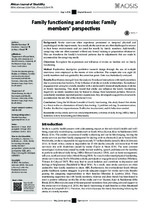| dc.contributor.author | Gawulayo, Sibulelo | |
| dc.contributor.author | Erasmus, Charlene J. | |
| dc.contributor.author | Rhoda, Anthea J. | |
| dc.date.accessioned | 2021-10-27T12:03:52Z | |
| dc.date.available | 2021-10-27T12:03:52Z | |
| dc.date.issued | 2021 | |
| dc.identifier.citation | Gawulayo, S. et al. (2021). Family functioning and stroke: Family members’ perspectives. African Journal of Disability 10(0), a801. https://doi.org/10.4102/ajod. v10i0.801 | en_US |
| dc.identifier.issn | 2226-7220 | |
| dc.identifier.uri | https://doi.org/10.4102/ajod. v10i0.801 | |
| dc.identifier.uri | http://hdl.handle.net/10566/6969 | |
| dc.description.abstract | Stroke survivors often experience permanent or temporal physical and
psychological stroke impairments. As a result, stroke survivors are often discharged to recover
in their home environments and are cared for mostly by family members. Additionally,
caregiving roles are often assumed without any formal training or preparation whatsoever.
This can transform the family’s functional patterns due to adjustments that are made to
accommodate the caregiving needs.To explore the experiences and influence of stroke on families and on family
functioning. | en_US |
| dc.language.iso | en | en_US |
| dc.publisher | AOSIS | en_US |
| dc.subject | Stroke | en_US |
| dc.subject | Stroke survivor | en_US |
| dc.subject | Stroke impairments | en_US |
| dc.subject | Family functioning and dimensions | en_US |
| dc.subject | Public health | en_US |
| dc.title | Family functioning and stroke: Family members’ perspectives | en_US |
| dc.type | Article | en_US |

